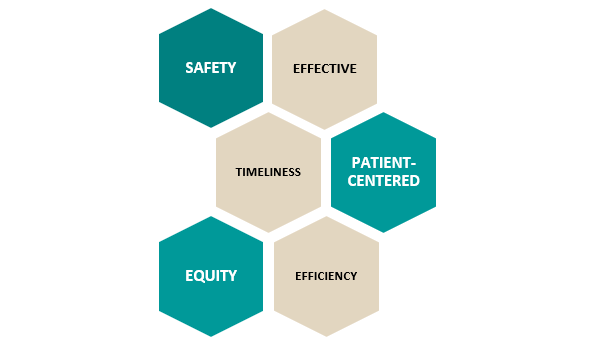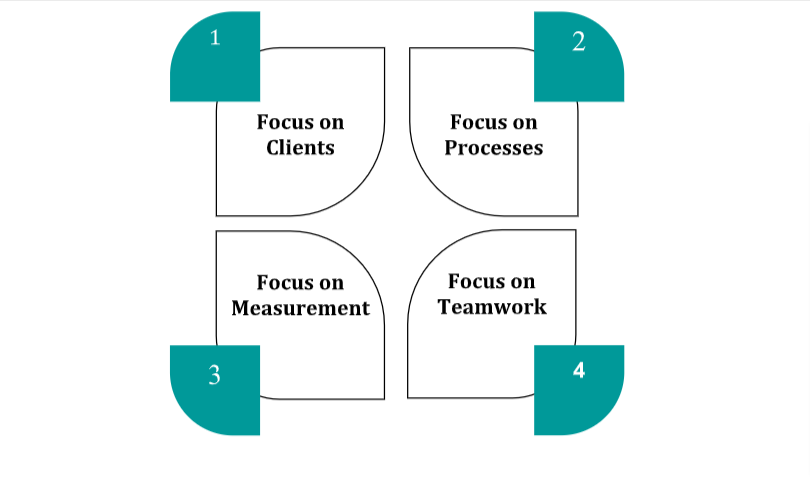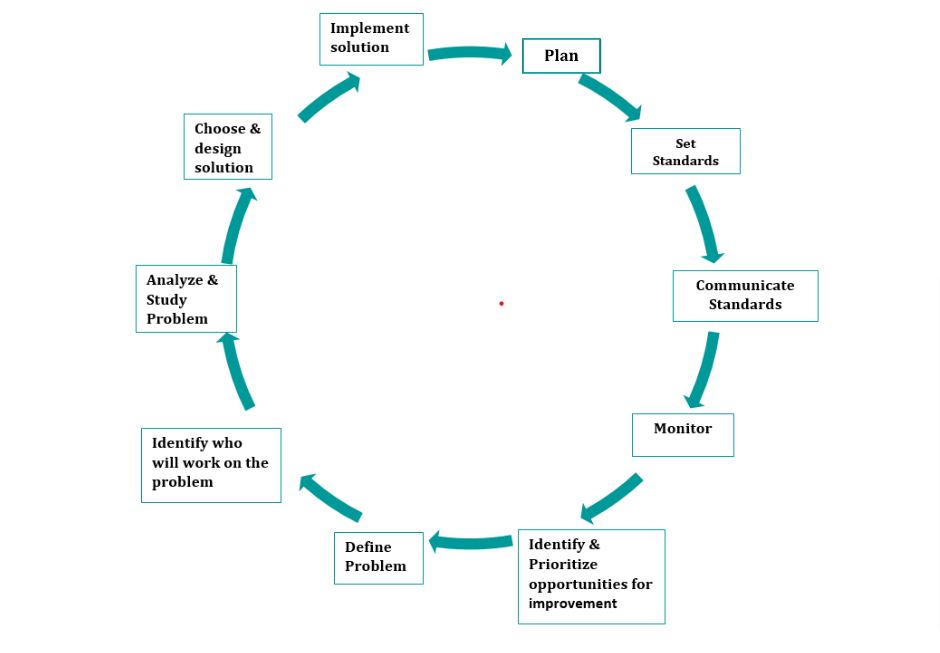INTRODUCTION
Quality assurance (QA) is all activities that contribute to defining, designing, assessing, monitoring, and improving healthcare quality. These activities can be performed as part of the accreditation of facilities, supervision of health workers, or other efforts to improve the performance of health workers and the quality of health services.
The Institute of Medicine (IOM) has identified six dimensions of quality in healthcare. It involves providing safe, effective, timely, patient-centered, equitable, and efficient care that is supported by evidence-based practices and is focused on achieving positive outcomes.

- Safe: Avoiding harm to patients from the care that is intended to help them.
- Effective: Providing services based on scientific knowledge to all who could benefit and refraining from providing services to those not likely to benefit (avoiding underuse and misuse, respectively).
- Patient-centered: Providing care that is respectful of and responsive to individual patient preferences, needs, and values and ensuring that patient values guide all clinical decisions.
- Timely: Reducing waits and sometimes harmful delays for those who receive and give care.
- Efficient: Avoid waste, including waste of equipment, supplies, ideas, and energy.
- Equitable: Providing care that does not vary in quality because of personal characteristics such as gender, ethnicity, geographic location, and socioeconomic status.
COMPONENTS OF QUALITY ASSURANCE
Quality Assurance consists of three components:
- Defining Quality
- Improving Quality
- Measuring Quality
International Organization for Standardization (ISO) provides quality certification for a product that follows all its guidelines. According to ISO 900 standard, clause 3.2.11, Quality Assurance is the part of quality maintenance that provides confidence to a consumer that the product meets quality standards and is safe to use. According to ISO 900 standard, clause 3.2.10, Quality Control is the part of quality management that is done to check a product or service fulfills all quality guidelines.
Four core principles for quality assurance in healthcare:

Focus on the Client
Health services exist to meet the health needs of clients, so the delivery of health services should be designed to meet those needs. A focus on the client examines how and whether each step in a process is relevant to meeting client needs and eliminates steps that do not ultimately lead to client satisfaction or desired client outcomes. This focus on the client can be achieved by gathering information about clients and then designing services to cater to the needs that are discovered. Client-focused organizations meet client needs and expectations, thereby providing higher-quality care. This encourages clients to return when they need additional care and to recommend the services to others.
Focus on Systems and Processes
Quality management views all work in the form of processes and systems. Systems are arrangements of organizations, people, materials, and procedures that together are associated with a particular function or outcome. The figure below shows that a system consists of inputs, processes, and outputs/outcomes. A process is defined as “a sequence of steps through which inputs from suppliers are converted into outputs for customers.” All processes are directed at achieving one goal or output from the system that encompasses the processes.
Focus on Measurement
In quality assurance, data are used to analyze processes, identify problems, test solutions, and measure performance. Data are important because they ensure objectivity. For example, the collection and analysis of data allow us to develop and test hypotheses. Comparing data from before and after a change can allow us to verify that the changes have led to improvements.
Focus on Teamwork
A team is “a high-performing task group whose members are interdependent and share a common performance objective” (Francis and Young 1992). QA Project experience has shown that teams are important to QA for several reasons. First, processes consist of interdependent steps that are executed by different people, so the group working within a process will understand it better than any one person. Including key people in the improvement of a process often involves clarifying and incorporating the insights and needs of clients into healthcare delivery. The participation of major stakeholders improves the ideas generated, builds consensus about changes, and reduces resistance to change. Moreover, mutual support and cooperation arise from working together on a project, leading to increased commitment to improvement. Such an atmosphere of support discourages blaming others for problems. Finally, the accomplishments of a team often increase the members’ self-confidence. This empowers staff to work towards the goal of quality by motivating them to contribute their knowledge and skills to improve organizational and individual performance.
QUALITY ASSURANCE CYCLE IN HEALTHCARE

- Plan the Quality Assurance Strategy
- Set the standards which will be used to check the quality of services and will be tried to accomplish.
- Communicate these standards with the organization and patient to check if they need some modifications.
- Then monitor the current service quality.
- Compare the current status with the targeted one. The team will be able to identify the areas that need improvement.
- Prioritize the improvements to decide ‘on which weakness they should work first?’.
- Define the problem in a detailed way
- Then a team should be built to work on that problem and will be responsible for fixing it.
- The team will analyze and study the problem carefully and will come up with some observations like ‘What is the reason for the problem? who is affected by the problem? and who is responsible for the problem?’.
- Then a solution would have to be figured out to solve the problem and design a system to implement the same.
- The last step is the execution of the solution of the problem.
IMPORTANCE OF QUALITY ASSURANCE IN HEALTHCARE
- Patient safety: Quality assurance programs aim to prevent errors, identify and mitigate risks, and ensure patient safety. It is essential to maintain high standards of safety in healthcare delivery to minimize harm to patients and prevent avoidable complications.
- Improved outcomes: Quality assurance programs can help improve health outcomes by promoting evidence-based practices, reducing variations in care, and ensuring that patients receive appropriate care.
- Cost-effective care: Quality assurance programs help ensure that healthcare services are delivered efficiently, which can result in cost savings. By avoiding unnecessary tests, procedures, and hospital stays, healthcare providers can reduce costs and improve the overall value of healthcare.
- Regulatory compliance: Healthcare providers are subject to regulatory requirements, and quality assurance programs can help ensure compliance with these standards. Compliance with regulatory requirements can help healthcare providers avoid legal penalties, lawsuits, and reputational damage.
- Continuous improvement: Quality assurance programs involve ongoing monitoring, evaluation, and improvement of healthcare services. This process ensures that healthcare providers are continuously striving to improve the quality of care they provide, leading to better outcomes for patients.
CONCLUSION
In conclusion, the role of quality assurance in healthcare is critical to ensuring that patients receive safe, effective, and timely care. Quality assurance programs help healthcare providers identify areas for improvement, reduce variations in care, and promote evidence-based practices. They also ensure compliance with regulatory requirements, minimize errors, and improve patient outcomes. By continuously monitoring and evaluating healthcare services, quality assurance programs promote ongoing improvement and help healthcare providers provide high-quality care to their patients. Therefore, quality assurance is an essential component of healthcare delivery that benefits patients, providers, and the healthcare system as a whole.
For market and financial feasibility or any other study related to healthcare is required you can contact Hospaccx Healthcare business consulting Pvt. ltd hospaccx.india@gmail.com
















